European Central Bank Follows U.S. in Raising Interest Rates
- Share via
PARIS — Following the U.S. Federal Reserve’s lead, Europe’s central bank hiked interest rates on the euro by a quarter point Thursday, eager to tamp down inflation and rescue the multinational currency that hit record lows this week.
Leaders of the European Central Bank raised the benchmark interest rate, the Refi, to 3.25%. It was the third rate change in the short history of the euro, which was created Jan. 1, 1999, and currently exists in all forms but cash.
The ECB’s president, Wim Duisenberg of the Netherlands, said he and other members of the bank’s governing council were worried that the slump in the euro’s value--it hit a record low of 96.65 U.S. cents Monday--would kindle inflation because imports priced in dollars and other foreign currencies, including petroleum, will cost more in Europe.
Some analysts read Duisenberg’s comments as presaging yet another rate hike soon. “Monetary policy must act in looking toward the future,” Duisenberg said.
The Europeans acted a day after the Federal Reserve raised short-term lending rates by a quarter-point to 5.75%, the highest level in more than four years, also to keep inflation at bay.
Analysts said the Fed’s decision increased pressure on the Europeans to act, since higher U.S. interest rates make dollar investments even more attractive to the detriment of the euro and other competing currencies.
After the central bankers assembled in Frankfurt, Germany, ordered the increase, the euro gained to close at nearly 99 cents in New York. Across Europe, stock markets rallied powerfully on the rate news--up 2.5% in Germany, 3.4% in France, 2.5% in Italy and 3.3% in the Netherlands.
For months, Duisenberg and other ECB officials had played down the effect of the euro’s weakness on price stability in the 11 euro countries--Austria, Belgium, Finland, France, Germany, Ireland, Italy, Luxembourg, the Netherlands, Portugal and Spain.
But lately, “inflation risks have escalated and the euro is forcing the ECB to act,” Mathias Fahr, director of fixed-income sales at ABN Amro Bank, told Bloomberg News.
Since its inception, the euro has lost more than 16% of its value relative to the dollar. Duisenberg on Thursday said higher interest rates should boost the currency’s value by ensuring its attractiveness for foreign investors.
The ECB’s chief mandate is to keep inflation in the euro zone below 2% annually. In December, annual price increases in the region accelerated to 1.7%, a 28-month high. This week, the European Union’s commission on monetary affairs warned that the euro’s slump could bump inflation forecasts to 1.9% this year.
The increase in the ECB’s main refinancing rate, which it charges for two-week loans, was the first since November, when it was boosted by a half percentage point.
Despite the euro’s slide, European finance ministers have been insisting this week that growth prospects for this year are good, and that their currency should soon rebound. According to the EU, the euro zone economy, about two-thirds the size of the U.S. economy, should expand by 2.9% this year, the hottest pace since 1990.
So far, though, the Europeans have been outstripped by the United States. In 1999, the U.S. economy, supercharged by the Internet and other new technologies, grew by 4%, compared with an estimated 2.1% in the euro region.
“Of course, we are being influenced by the startling and continued high rate of growth in the United States that underscores the strength of the dollar compared with the euro,” Duisenberg said. “But we are rapidly coming in step with the U.S. economy, and that should affect exchange rates as well. A strong economy goes along with a strong currency.”
At present, the euro is used in noncash transactions, including the issuance of government bonds. Starting Jan. 1, 2002, coins and bank notes in euros will replace francs, marks, lire and the other national currencies in the 11 participating countries.
More to Read
Sign up for Essential California
The most important California stories and recommendations in your inbox every morning.
You may occasionally receive promotional content from the Los Angeles Times.













